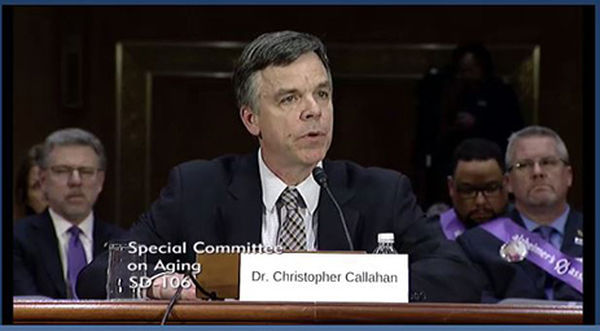The U.S. Senate Special Committee on Aging held an important public hearing last week entitled, “The Arc of Alzheimer’s: From Preventing Cognitive Decline in Americans to Assuring Quality Care for those Living with the Disease.”
It was encouraging to see that some of our nation’s top policymakers are paying attention to the pressing needs of family members who care for people with dementia. Senator Susan Collins of Maine, Chairman of the Committee, and Senator Bob Casey of Pennsylvania, the Committee's Ranking Member, are both passionate advocates for older adults. They presented insightful questions and comments at this hearing, held in conjunction with the Alzheimer's Assocation Advocacy Forum.
As we at The John A. Hartford Foundation continue to develop programs under our Family Caregiving priority area, we know that we must pay special attention to the growing number of families grappling with Alzheimer’s disease and similar conditions. The special challenges facing this population are the subject of one of our recent grants, as well as a Huffington Post article by JAHF President Terry Fulmer. We need more policymakers to similarly focus their energies on this topic.
For those who may have missed it on C-SPAN, you can watch a video of the testimony here. In addition to the star power brought by Maria Shriver, a fierce advocate for better Alzheimer’s care and for the women who bear the brunt of caregiving responsibilities, the Senators heard from Dr. Christopher Callahan of Indiana University. Dr. Callahan is a long-time grantee and colleague of ours, most recently serving on The John A. Hartford Foundation Change AGEnts Initiative Dementia Caregiving Network. In his testimony, he carries forward several messages that we believe are critically important.
First, he notes that new models of care have been developed by our Foundation and others that work in improving outcomes for people with dementia and their family caregivers. As we have written previously, there are programs and services that are proven to be effective and need to be made more available. According to Dr. Callahan:
“In 2017, the question is not whether we have programs to assure quality care, the question is how we take these programs to scale so that they are available to all American families struggling with Alzheimer’s disease.”
He cites current workforce gaps as one limiting factor in making these programs accessible to the millions of people in need. He calls for better training and support for nurses and social workers. He also calls for an expansion of the direct-care workforce, such as home health aides who are so critical to the daily lives of people with dementia and their families.
In the question and answer period, Senator Collins expressed her concern about these workforce issues and the administration's proposed cuts to the federally funded Geriatrics Workforce Enhancement Program (GWEP). We fund the American Geriatrics Society (AGS) to serve as a coordinating center for the 44 GWEP sites. We also support the Eldercare Workforce Alliance, which is a strong advocate for these and other related programs. We are grateful to Senator Collins' leadership in raising this important concern.
Dr. Callahan concludes his remarks with an incredibly important statement that expands on the workforce issue. He expresses a current reality that too often goes overlooked:
“Family caregivers are the hands, backbone, and hearts of the nation’s workforce for Alzheimer’s disease,” he says. "The best way to help persons with dementia is to help their family caregiver."
In written testimony, Dr. Callahan, delves even deeper into these issues. He reviews the evidence we have that shows us a better way to care for people living with Alzheimer’s disease. He points to three federally funded programs that should be expanded, including the OPTIMISTIC nursing home program that the Foundation has helped support.
Joining Dr. Callahan and Ms. Shriver in testifying were two other incredibly impressive experts: Dr. Kristine Yaffe, a Beeson Scholar (along with Dr. Callahan), and a highly respected researcher who discusses risk factors and emerging science on the prevention of Alzheimer's disease; and probably most importantly, a family caregiver, Phyllis Gallagher, who shares her own personal experience caring for her husband, John.
We applaud the entire panel and the U.S. Senate Special Committee on Aging for exploring this important topic. Now, it’s time to take action and support the spread and scale of programs that can help families living with Alzheimer’s disease.
Download a PDF of Dr. Callahan’s full written testimony from the U.S. Senate Special Committee on Aging’s website, which expands on his remarks to the Committee.
To watch the video of the testimony, click here. Dr. Callahan's Testimony starts at 01:57:45.

